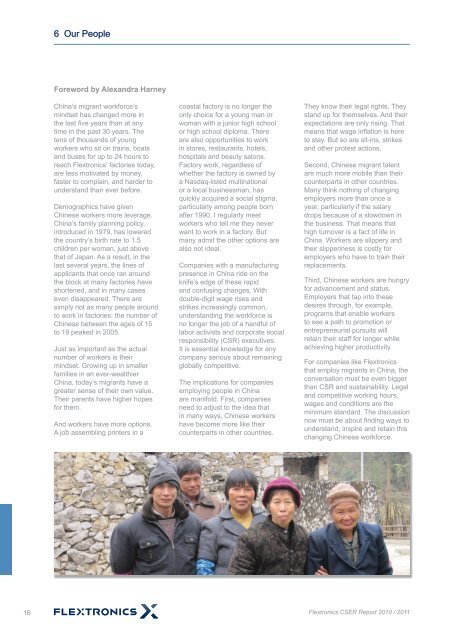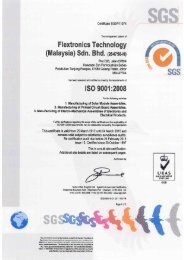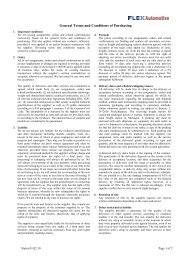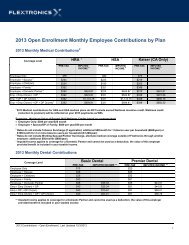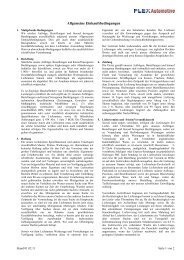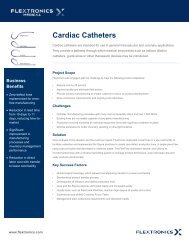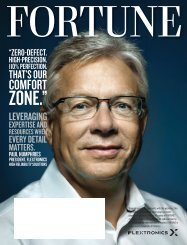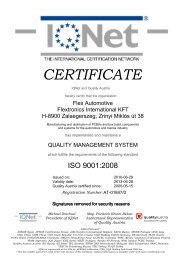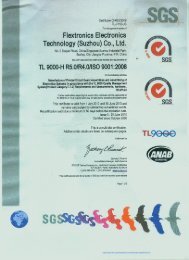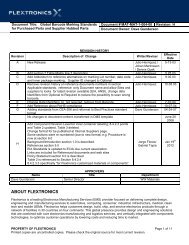CSER Sustainability Report (English) - high res-rev - Flextronics
CSER Sustainability Report (English) - high res-rev - Flextronics
CSER Sustainability Report (English) - high res-rev - Flextronics
Create successful ePaper yourself
Turn your PDF publications into a flip-book with our unique Google optimized e-Paper software.
16<br />
6 Our People<br />
Foreword by Alexandra Harney<br />
China’s migrant workforce’s<br />
mindset has changed more in<br />
the last five years than at any<br />
time in the past 30 years. The<br />
tens of thousands of young<br />
workers who sit on trains, boats<br />
and buses for up to 24 hours to<br />
reach <strong>Flextronics</strong>’ factories today,<br />
are less motivated by money,<br />
faster to complain, and harder to<br />
understand than ever before.<br />
Demographics have given<br />
Chinese workers more leverage.<br />
China’s family planning policy,<br />
introduced in 1979, has lowered<br />
the country’s birth rate to 1.5<br />
children per woman, just above<br />
that of Japan. As a <strong>res</strong>ult, in the<br />
last several years, the lines of<br />
applicants that once ran around<br />
the block at many factories have<br />
shortened, and in many cases<br />
even disappeared. There are<br />
simply not as many people around<br />
to work in factories: the number of<br />
Chinese between the ages of 15<br />
to 19 peaked in 2005.<br />
Just as important as the actual<br />
number of workers is their<br />
mindset. Growing up in smaller<br />
families in an ever-wealthier<br />
China, today’s migrants have a<br />
greater sense of their own value.<br />
Their parents have <strong>high</strong>er hopes<br />
for them.<br />
And workers have more options.<br />
A job assembling printers in a<br />
coastal factory is no longer the<br />
only choice for a young man or<br />
woman with a junior <strong>high</strong> school<br />
or <strong>high</strong> school diploma. There<br />
are also opportunities to work<br />
in sto<strong>res</strong>, <strong>res</strong>taurants, hotels,<br />
hospitals and beauty salons.<br />
Factory work, regardless of<br />
whether the factory is owned by<br />
a Nasdaq-listed multinational<br />
or a local businessman, has<br />
quickly acquired a social stigma,<br />
particularly among people born<br />
after 1990. I regularly meet<br />
workers who tell me they never<br />
want to work in a factory. But<br />
many admit the other options are<br />
also not ideal.<br />
Companies with a manufacturing<br />
p<strong>res</strong>ence in China ride on the<br />
knife’s edge of these rapid<br />
and confusing changes. With<br />
double-digit wage rises and<br />
strikes increasingly common,<br />
understanding the workforce is<br />
no longer the job of a handful of<br />
labor activists and corporate social<br />
<strong>res</strong>ponsibility (CSR) executives.<br />
It is essential knowledge for any<br />
company serious about remaining<br />
globally competitive.<br />
The implications for companies<br />
employing people in China<br />
are manifold. First, companies<br />
need to adjust to the idea that<br />
in many ways, Chinese workers<br />
have become more like their<br />
counterparts in other countries.<br />
They know their legal rights. They<br />
stand up for themselves. And their<br />
expectations are only rising. That<br />
means that wage inflation is here<br />
to stay. But so are sit-ins, strikes<br />
and other protest actions.<br />
Second, Chinese migrant talent<br />
are much more mobile than their<br />
counterparts in other countries.<br />
Many think nothing of changing<br />
employers more than once a<br />
year, particularly if the salary<br />
drops because of a slowdown in<br />
the business. That means that<br />
<strong>high</strong> turnover is a fact of life in<br />
China. Workers are slippery and<br />
their slipperiness is costly for<br />
employers who have to train their<br />
replacements.<br />
Third, Chinese workers are hungry<br />
for advancement and status.<br />
Employers that tap into these<br />
desi<strong>res</strong> through, for example,<br />
programs that enable workers<br />
to see a path to promotion or<br />
entrepreneurial pursuits will<br />
retain their staff for longer while<br />
achieving <strong>high</strong>er productivity.<br />
For companies like <strong>Flextronics</strong><br />
that employ migrants in China, the<br />
conversation must be even bigger<br />
than CSR and sustainability. Legal<br />
and competitive working hours,<br />
wages and conditions are the<br />
minimum standard. The discussion<br />
now must be about finding ways to<br />
understand, inspire and retain this<br />
changing Chinese workforce.<br />
<strong>Flextronics</strong> <strong>CSER</strong> <strong>Report</strong> 2010 / 2011


